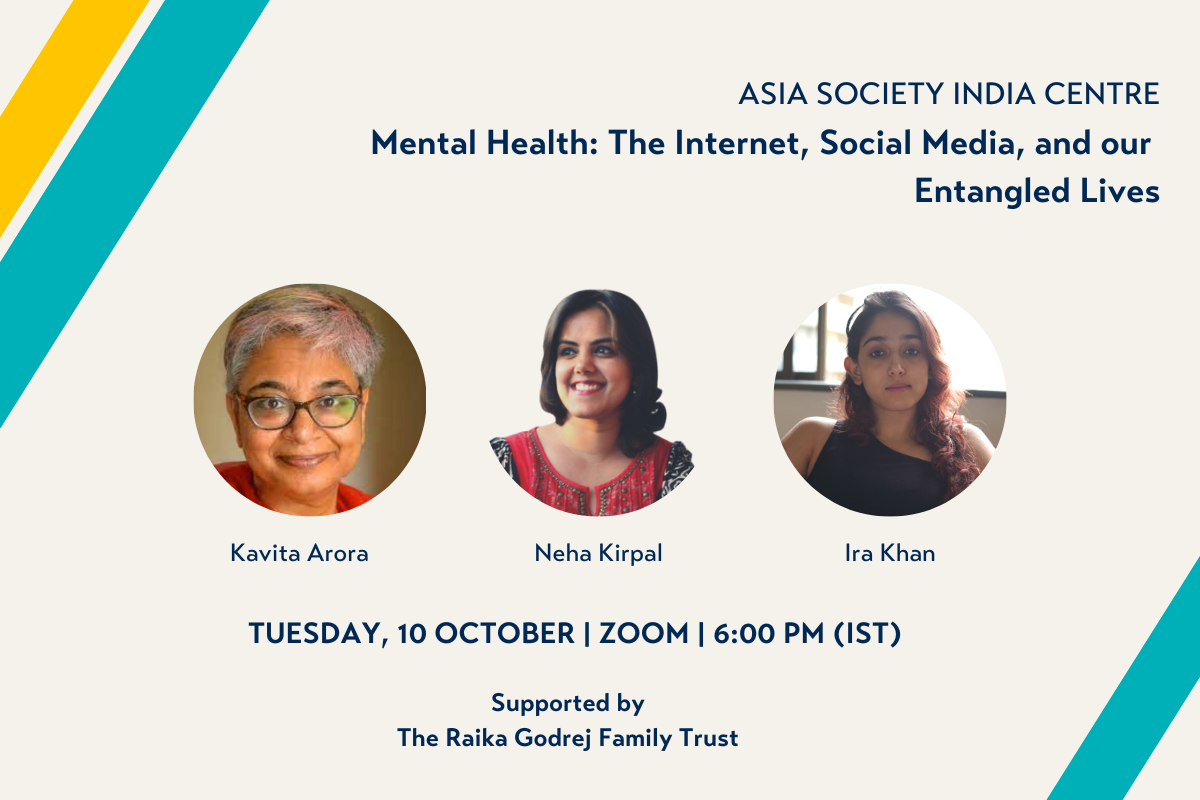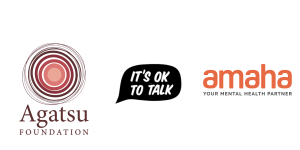Mental Health: The Internet, Social Media, and Our Entangled Lives
VIEW EVENT DETAILSTuesday, 10 October, 6:00 p.m. – 7:30 p.m.

In 1982, Time magazine replaced its well-known 'Person of the Year' award category with ‘Machine of the Year.’ The corresponding magazine cover, illustrating a man sitting at a desktop computer, featured the simple words: ‘the computer moves in.’ In the 1990s, as personal-use computers were being invented and innovated, less than 0.05% of the world was online. Since then, an unprecedented rate of technological advancement has brought the Internet to our doorsteps and fingertips. Globally, over 5 billion people now use the Internet, and mobile phone Internet penetration in India has gone up from 2% to over 70% in the last 10 years.
When we exist online, we experience a curious shift in our personalities, which psychologists call a virtual self-discrepancy – the difference between our actual and ‘virtual’ selves. This has a wide range of implications, particularly on young people, including mood disorders and addiction formation, as well as a fundamental transformation in how we interact with each other. Almost half of the children in India report worrying about cyberbullying and pressure on social media. In the recent past, an Internet-based self-harm ‘challenge’ called Blue Whale has affected the health and lives of at least one hundred teenagers world over, a dark reminder of what happens when young people, social media, and self-discrepancy combine.
There are also positive sides to the anonymity that the Internet can offer. Supplementing traditional medical care, peer support groups offer conversation and compassion, circumventing the ‘real’ world’s limitations including stigma toward mental conditions; and limited access to in-person mental healthcare in one’s social network. But how far does the Internet help in mental well-being, and what more can we do?
In this conversation, we explore the questions: What are the particular mental health and safety concerns across different populations? How does the personalisation of the internet affect its users? Finally, how can we build safe mechanisms for the usage and regulation of the Internet and social media in India? Neha Kirpal, co-founder, Amaha, will be in conversation with Ira Khan, founder and CEO, Agatsu Foundation, and Kavita Arora, psychiatrist and co-founder, Children First.
Our series on mental health is now in its third season. This capsule of discussions will focus on mental health and social fabrics, and how our social realities in India shape our sense of self; our identity; and our mental well-being. In the past, we have looked at addiction, disorders, the impact of the pandemic on specific populations, art and creativity – you can learn more here. This series is supported by the Raika Godrej Family Trust.
Outreach Partners

Speaker

Kavita Arora is the co-founder of Children First Mental Health Institute, a child and adolescent mental health service in the National Capital Region, India. She loves to connect with children and young people. She is of the firm belief that youngsters today are far smarter and quicker to learn and evolve than previous generations. She is curious about new perspectives, and prefers a question to an answer.
She happens to be qualified as a psychiatrist, and has recently done an advanced diploma in NDP (neurodramatic play). She loves the internet, poetry, animals and most of all a good joke!

Neha Kirpal has worked for over a decade and a half at the intersection of the creative and social sectors. Having founded India’s first international art fair, she ran it successfully for ten years before selling the business and moving her focus entirely to the marginalised sector of mental health. As a social entrepreneur, Neha brings tremendous experience in weaving impact networks with great passion and commitment, stemming from her own family’s mental health struggles for over three decades. In 2019, Neha joined Dr. Amit Malik as co-founder of Amaha, one of India’s largest mental health organisations delivering accessible and high-quality treatment, care and support in 15+ languages, with an in-house team of over 110 psychologists and psychiatrists. Today, Amaha’s digital platform has touched over 4.5 million people globally.
Having delivered over 35,000 therapy and psychiatry sessions in the last year to people in over 300 Indian cities, Amaha now offers in-person consultations at its first three centres in Bangalore, Mumbai and Delhi NCR. A global mental health ambassador, Neha is a member of the general body of Sangath, an international NGO specialising in mental health research. She co-founded Librum, a mental health consulting venture with Dr Vikram Patel and Dr Shekhar Saxena, to work with NGOs, governments and institutions on systems solutions for global mental health.
An Aspen Fellow (2018) and an Eisenhower Fellow (2018), Neha is part of the World Economic Forum’s Young Global Leaders community (2015-2020). She received the NDTV Indian of the Year award (2018), Fortune Magazine’s 40 under 40 (2015), and Business Today’s.India’s Most Powerful Women award for three consecutive years.
Ira Khan is the founder and CEO of Agatsu Foundation. The kindness of her heart is rivaled only by the fire of her spirit. As a child she dreamed of defeating humanity’s enemies with the help of an army of animals. Now–older and wiser–she recognizes that human beings themselves are humanity’s greatest enemies when they are busying themselves not being its champions. Agatsu is her invitation to everyone to confront the unknown within and find their own truth.